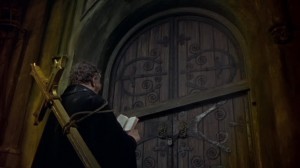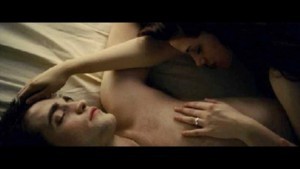The loss of the epic vampire
(October, the month of Halloween, conjures one name in our household: Dracula! This is the first of a series of posts on various aspects of Dracula and vampires in general. I’ll be giving away a two-pack of my own vampire novels Blood Groove and The Girls with Games of Blood to one lucky commenter per post, so comment early, comment often!)
Recently I came across an article by Elizabeth Russell Miller, an internationally-known expert on all things Bram Stoker, entitled, “The Church Welcomes Dracula.”
The story of this Dublin church honoring Dracula is fun on its surface, but it got me thinking about vampires and religion, a relationship that has lost almost all its potency in the last forty years. When I was a kid, vampires were terrified of all things religious, specifically Catholic icons. There were occasional riffs on that, most famously the Jewish bloodsucker in The Fearless Vampire Killers. But for the most part it was accepted, and accepted seriously: the athiest hero of the Hammer classic Dracula Has Risen from the Grave must become a believer to defeat Dracula.
But as religion faded from its importance in everyday life, it also faded from vampire lore. Anne Rice’s vampires are indifferent to religious iconography, as are those of Buffy the Vampire Slayer. The pantsless vamps of True Blood have no issue with it. And so on. But what has replaced religion in vampire mythology?
Apparently, it’s love.
Love destroys vampires as surely as sunrise, wooden stakes or fire. Where once stood an immortal symbol of the power of the devil, the literal anti-Christ (the vampire’s nightly resurrection mocks Christ’s, for example), we now have tortured, sympathetic heroes. And not even anti-heroes like the magnificently nihilistic Lestat, but actual heroes who try to do good, defeat the bad guys (often more “traditional” vampires) and win the damsel (often without actually biting her). This has culminated in the Twilight, saga, which is all about not doing…well, anything. Once the active hand of the devil on earth, vampires are now horror’s answer to the Amish.
When only the Church (capital “C”) stood between humanity and the vampire, it was understood as a battle for immortal things like souls. It was an epic battle. Powers as old as the universe contended for the soul of a man or woman, a prize so valuable both God and the Devil wanted it. Now…well, the prize is Bella Swan’s virginity. And losing it doesn’t damn her to hell for all eternity; rather, it elevates her into the nouveau beaute’ pantheon.
Now, I’m not a religious person, but as a writer, I understand the maxim that heroes are judged by the power of their villains. Imagine Batman without the Joker, Superman without Lex Luther, or Sherlock Holmes without Moriarty; their stature would be seriously diminished. Similarly, the classic vampire is scary and significant because, within that mythology, even God himself takes notice and stands against him. That’s a powerful trope, and one that’s proven very hard to replace.
When I wrote my two “vampsloitation” novels, Blood Groove and The Girls with Games of Blood, I deliberately left out religion, intending to use it as an element in the climactic third book. Alas, the first two did not exactly fly off shelves or into e-book readers,* so it may be some time before that final novel, Blood Will Rise Again, sees the light of day. But when it does, I hope to recapture some of that classic epic feel, of the idea that what’s at stake (heh) when a vampire meets a human is more than just hemoglobin and an undead booty call. I hope to make it…well, cosmic. That’s the playing field vampires should occupy.
*I must say, though, that the fans of these novels are some of my most passionate; for those that “get it,” they really get it, and I appreciate hearing from them.





